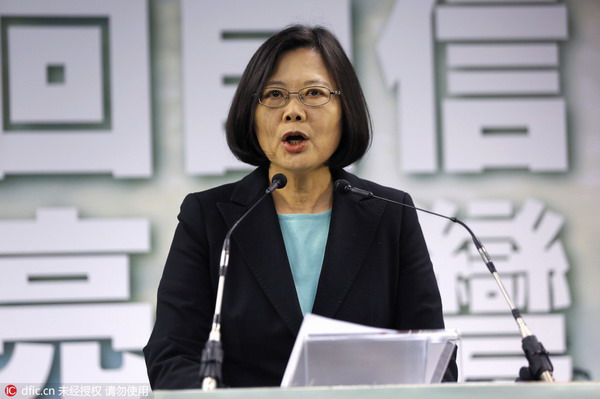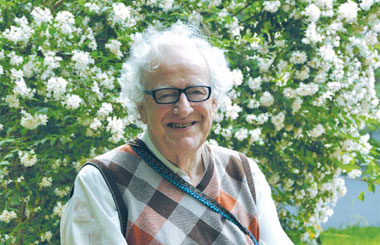Coping with Tsai's conjuring of 'de facto independence'
Updated: 2016-05-24 08:00
By SHIH CHIH-YU(China Daily)
|
|||||||||
 |
|
Taiwan's main opposition Democratic Progressive Party, DPP, Chairperson Tsai Ing-wen speaks during a press conference in Taipei, Taiwan, Wednesday, April 15, 2015. [Photo/IC] |
As expected, the inauguration speech by Tsai Ing-wen avoided any reference to the 1992 Consensus. This is consistent with her long-standing position of no commitment to the one-China principle.
Tsai's consistent message, albeit ostensibly ambiguous, is either "two Chinas" or "de facto independence", which is why she shuns the consensual atmosphere that her predecessor Ma Ying-jeou and the mainland established. She contends that Ma's endorsing of the Consensus and the goodwill extended by the mainland as a result, although benefiting Taiwan's economy, have reduced Taiwan to being like a beggar at the mercy of the mainland's benevolence. As a result, Taiwan is dependent on the mainland's continued goodwill, which she believes has strengthened the mainland's leverage over her government.
Strategically, Tsai's avoidance of any direct acknowledgement of the Consensus is meant to eventually break the mainland's leverage. Thus the status quo to which she has pledged to adhere has nothing to do with the consensual policy of one China that Ma embraced. Rather, it is purely a policy supported exclusively by her constituency in Taiwan, and has nothing at all to do with any agreement with the mainland.
The mainland cannot help but feel alienated from Tsai's unilateral approach to the status quo, since in actuality, she is substituting a "two China" policy for the previous consensual one-China principle.
For Tsai, it is up to the mainland to decide whether or not to resort to sanctions for her disregard of the Consensus. In Tsai's mind, as long as there is no room for the mainland to participate in her policymaking, Taiwan stays "independent". Even though she cannot officially declare "independence", she can still convince her supporters that at least she has secured "de facto independence". After all, she owns a "constitutional" process that could initiate reinterpretation or amendment of Taiwan's "one-China constitution".
The options left for the mainland are apparently limited. On the contrary, the drive for future development and the diplomatic "striving for achievement" continue to orient Beijing's attention toward a better world that the rise of China can benefit. Such an orientation sets the parameters for mainland's approach to the cross-Straits relationship and may therefore take Taiwan away from being among the priorities in its agenda.
However, target-exact pressure from the mainland will unavoidably mount on those discernable secessionist forces in Taiwan, especially economically. A general pressure will likewise spread all over Taiwan. The former pressure will have the official acknowledgement from the mainland so that the nature of the sanctions is clear. However, the mainland will probably deny its connection with the latter so that Tsai's government cannot mobilize popular opinion in Taiwan against the mainland. Together, the two pressures will test how firmly the population stands on de facto "independence".
By extolling Taiwan's own "constitutional" process and denying the existence of any contractual consensus, Tsai's speech may delay the mainland's feedback to her policy. She could succeed for the time being as her wording and intention stir rhetorical dust that will take time to settle down. It is not clear, though, how far people on the island will be willing to go along with her under the two aforementioned pressures.
The author is a political scientist affiliated with a Taiwan-based university.
Related Stories
Tsai shows no goodwill on cross-Strait ties: mainland scholar 2016-05-23 15:42
Tsai's only sensible option is to endorse Consensus 2016-05-23 08:30
Tsai's inaugural speech leaves crucial Straits questions unanswered 2016-05-21 08:05
Overseas media, experts voice worries over Tsai Ing-wen's equivocation 2016-05-22 13:09
Today's Top News
Alibaba expands in Belgium amid protectionism
Eiffel Tower to become rental apartment for first time
Wreckage of crashed EgyptAir plane found at sea
Still learning
EgyptAir denies finding wreckage of missing flight
China urges US to halt close surveillance
Debris found in sea in search for missing MS804
LinkedIn matches refugees with jobs
Hot Topics
Lunar probe , China growth forecasts, Emission rules get tougher, China seen through 'colored lens', International board,
Editor's Picks

|

|

|

|

|

|







